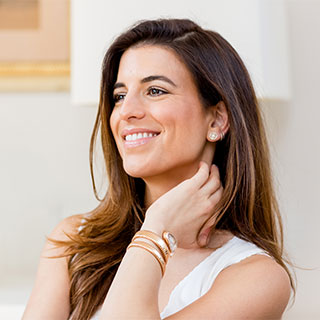Is Sun Exposure Good or Bad For You?
Hello Everyone!
There is still so much debate about whether the sun is good for you or bad for you, so I decided to do a post on it.
I have noticed that everyone recommends something different depending on the studies that they are most aligned with.
Also, let’s remember the focus of many campaigns discussing the perils of sunshine.
We have come from a culture of roasting in the sunshine to completely avoiding the sun, which results in either skin cancer or vitamin D deficiency.
Here is my take on it in a nutshell:
Sun exposure is so good for you! In moderation. With protection.
I will explain why.
How Does Sunshine Benefit Your Body?
What About Melanin and Sun Exposure?
Are Vitamin D Supplements Enough?
Do Vegetarians Lack Vitamin D?
Is Everyone Dairy Intolerant?
What Happens to Our Bodies Without Vitamin D?
Should I Avoid the Sun on Statins?
Sunshine Exposure and Cancer
How the Sunshine Combats Viruses
How the Sunshine Helps Sleep
Why the Sunshine Suppresses Appetite
How to Sunbathe Safely
What Sunscreen is Best?
Benefits of Sun Exposure Summary:
How Does Sunshine Benefit Your Body?
There are multiple benefits that the mind and body receive from the sunshine, physically, mentally, and emotionally.
Let’s start with vitamin D.
Vitamin D is essential for absorbing minerals to keep our bones, muscles, and teeth strong. It is also vital for our immunity and many more metabolic functions.

Unlike many essential vitamins obtained by food, vitamin D is synthesized through a photosynthetic reaction triggered by the presence of UVB radiation (which is from the sun).
90% is produced by sunlight and 10% by food.
The efficiency of vitamin D production from sunlight depends on the UVB protons that are penetrated into the skin.
Although the skin cells carry out this process, it is primarily the liver where the conversion occurs.
This is reduced if you are well-covered in clothing and sunscreen and have excess body fat.

What About Melanin and Sun Exposure?
Also, you must consider the skin pigment melanin—the darker the skin, the more vitamin D deficiency.
For instance, half an hour in the sun in a swimsuit yields 1.25mg of Vitamin D in blood circulation if you have light skin.
Tanned skin yields half of that, and dark skin yields half of that again at around .30mg.
This reveals, of course, that darker skin needs six times more skin exposure than pale skin for essential vitamin D photosynthesis.
It is recommended that a daily dose of 10-15 minutes for lighter skin and up to 120 minutes (dependent on skin pigments) of sun exposure provide good vitamin D production.

This also explains how winters and countries where light is restricted, and the need for clothes encourage the likeliness of SAD.
Many conditions are associated with a lack of vitamin D and less than optimal mental and physical health for all of us.
Of course, this doesn’t apply to sun-sensitive individuals and those taking medication that cause photosensitivity. They will need a good diet and supplements.
Vitamin D allows calcium absorption from the gastrointestinal tract.
Are Vitamin D Supplements Enough?
In my opinion, supplements are never enough. There is no comparison between supplements and foods (but they are necessary for some).
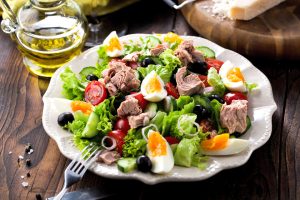
The body gets good vitamin D from food sources like mackerel, sardines, tuna, salmon, red meat, egg yolks, and mushrooms throughout these times.
Food is medicine.
Note: n anti-inflammatory, gut-healthy lifestyle supports your liver, immunity, cells, blood, and everything!
The bioavailability of nutrients in foods is always better than supplements because it is hard to increase serum levels via supplements alone.
It doesn’t even have to be organic, but food is always a better way of attaining the proper nutrients.
Do Vegetarians Lack Vitamin D?
Vegetarians may be at a greater risk of vitamin D deficiency because food sources of vitamin D are generally from animal sources. That is not the most significant concern with vegetarianism and veganism.
It is vitamins like B12 that vegetarians and vegans have to supplement.

If a vegetarian eats plenty of eggs, they may be getting enough B12, but plants do not contain bioactive forms of B12, so a vegan has to supplement.
Read: Help With Anemia, B12 and Iron Deficiencies, and What’s The Best Diet for Everyone?
I am not a great fan of veganism because supplements shouldn’t be needed.
We should be getting everything we need from a balanced diet.
(There are so many vegan and vegetarian recipes on the Eat Burn Sleep program, but to achieve optimum health, there’s a specialized advice section on reintroducing animal protein back into your diet again).
Watch the videos about why I don’t think being a vegan is a good move for optimum health and about my findings about supplements before you purchase any.
Is Everyone Dairy Intolerant?
Vitamin D is also present in dairy (but I don’t recommend dairy for many reasons), but it is hard to digest.
Although, it is interesting to note that people from Northern Europe are more likely to carry the gene that produces lactase, which allows them to digest lactose in the milk.
This means that these people can extract vitamin D from dairy. However, I can’t because I am from Morocco.
What Happens to Our Bodies Without Vitamin D?
Unfortunately, many Covid-19 fatalities were linked to vitamin D deficiency.
The coronavirus affected people with less sun because vitamin D is an immune regulator.
It is essential to have high vitamin D levels to fight viruses and stop autoimmune issues.

Vitamin D is important to maintain serum calcium and phosphorous levels to support metabolic functions, bone mineralization, and neuromuscular transmission.
Maintaining a good serum level is imperative to reduce many physical and mental conditions.
Without vitamin D, bones do not form properly, causing rickets in children and osteoporosis in women and men, and they go on to develop a painful disease called osteomalacia.
Breastfed infants of women who are vitamin D deficient are also at significant risk.
Without vitamin D, we are more prone to:
- a weakened immune
- low moods
- depression
- premenstrual tension
- hormonal disorders
- sleep disorders
- metabolic conditions
- being more susceptible to pain.

Should I Avoid the Sun on Statins?
You need vitamin D supplementation and exposure to sunshine if you are on statins.
Statins lower cholesterol, and you need cholesterol for vitamin D production.
Please follow the advice on sunbathing safely below to ensure you get maximum vitamin D.
You may be interested in watching the video about Cholesterol in the Videos section.
Sunshine Exposure and Cancer
Sun exposure and skin cancer surfaced in the late nineteenth century. People were cautioned to steer clear of the midday sun and not expose themselves to direct sunlight for more than ten minutes daily.
Three types of skin cancer became common worldwide, and the message was that too much sun caused skin cancer.
Yet, did you know that too little sunshine can be detrimental to other cancers?
Studies show that scientists are worried about the emphasis on avoiding skin cancer, which obscures the larger concerns of diseases that can be treated with sun exposure.
Too little vitamin D in the body is linked to significant illnesses.
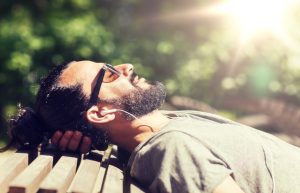
So, getting moderate sun exposure is more likely to be beneficial than not.
Members can read specialized advice for cancer prevention and recovery support here.
Also, listen to my special guest, Karin Greenberg, on the Eat Burn Sleep podcast on Surviving Breast Cancer. Her technique in coping is inspirational!
Have you read How Can You Prevent & Treat Cervical Cancer, Anti-cancer Diet: Recovery & Protection, & Reducing Cancer Risk & Recover Foods?
How the Sunshine Combats Viruses
Vitamin D induces cathelicidin, a polypeptide that effectively combats bacterial and viral infections.
This explains why effective treatment for influenza and tuberculosis in the last century was focused on putting patients in bed in the fresh air!
Also, this explains why people with sicknesses like tuberculosis, bronchitis, diabetes, rheumatic disorders, and wounds were sent to rest in sunny climes in later years.
Sunshine is linked to disease inhibition in arthritis, autoimmune diseases, thyroid, IBD, and many other chronic inflammation diseases.

How the Sunshine Helps Sleep
We are creatures programmed to be outdoors in the daylight and in bed when it is dark.
At this time, nocturnal melatonin is produced to aid in easier sleep patterns.
Melatonin is a key hormone for setting the body’s circadian rhythms.
Communicating a repeat signal to the brain and body, melatonin rises after dusk, commanding our bodies to sleep, and decreases throughout the night until we are exposed to sunlight or bright artificial light in the morning.
Active wakefulness is kicked in until dusk, and the cycle is repeated.
Melatonin also plays a vital role in reducing inflammation, countering infection, suppressing skin damage, and clearing other diseases.
Why the Sunshine Suppresses Appetite
Exposure to sunlight encourages the release of serotonin.
Also known as the happiness hormone, serotonin is a neurotransmitter produced in the central nervous system and the gut.
Serotonin regulates mood, sleep, appetite, digestion, memory, learning, and other cognitive functions.
As a precursor for melatonin, daylight exposure also affects serotonin and is only converted to melatonin in the darkness.

Moderately high serotonin levels result in positive moods and good mental well-being.
Modern-day indoor work and play activities reduce melatonin production.
So, if you work or play inside a lot, you must go outside regularly, seek beneficial lighting, and sleep in total darkness.
This will significantly affect energy, mood, and sleep quality.
Because sunlight helps regulate sleep and produce melatonin and serotonin, the body’s stress levels are decreased.
Eat Burn Sleep’s gut health program is packed with serotonin-inducing recipes that assist with balancing the gut-brain axis.
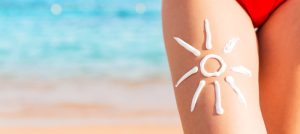
How to Sunbathe Safely
I love moderate sun exposure, with a hat on and SPF50 for my face and SPF30 for my body, which I reapply regularly.
Don’t forget hydration and drink lots of water (untreated, preferably).
I regularly use sunscreen by Organic Pharmacy (you can find the products I love on my Yalda Loves page).
What Sunscreen is Best?
I also use a mineral sunscreen, which I change regularly (because I love trying different skincare products). Plus, you need to buy a new one yearly because they go off.
I advise exposing the forearms and shins for thirty minutes between 12 noon and 3 pm throughout the warmer months for maximum vitamin D production.
It is important to remember that sunshine enters the skin, even with a high SPF sunscreen.
So, you can maximize vitamin D production by spending more time outside but with sunscreen on!
Without sunscreen, skin damage would be substantial (and vitamin D is not increased with longer spells in the sun).
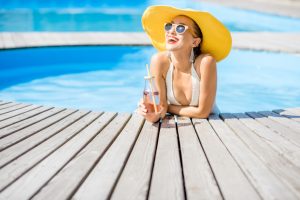
It just makes sense to wear sunscreen and a hat to minimize the risk of photo-aging and skin cancer.
Also, moments without sunglasses are essential because wearing them all the time alters melatonin rhythms.
When sunlight enters your eyes, it stimulates the part of your retina that then cue your brain to produce serotonin: that feel-good hormone!
It is good to note also that we don’t store vitamin D from one season to another. We keep it in the liver, and we utilize it!
Benefits of Sun Exposure Summary:
•Serotonin production – a natural appetite suppressant and better mood elevator!
•Vitamin D – produced by the kidneys, allowing calcium absorption from the gastrointestinal tract. Stronger bones!
•90% of vitamin D is produced from sunlight exposure and 10% from food
•Vitamin D is essential for immunity and lowering inflammation
•Better sleep – sunlight exposure supports our circadian rhythm and sleep function
•Better mental health- reduces risks of depression, stress, and SAD (seasonal affective disorder)
•Anti-inflammatory effects at the systemic level – disease protection

You can really feel the benefits of being outside in the sunshine.
Regarding food, exercise, having fun, being in the sun, and going to bed early, I always apply the same principle: moderation.
I am all about getting as much upside from all situations and as little downside as possible – and would recommend safe sun exposure for keeping happy, healthy, and the inflammation down!
Look after yourselves. Look after your health. It is the best form of self-respect and self-love.
You may also be interested in the following:
Reduce Asthma with an Anti-inflammatory Diet
How Do You Reduce Your Cholesterol?
Member’s Story – Losing Weight and Getting Rid of Depression

Also, since we are talking about sunshine, this anti-inflammatory snack, which I call ‘Sunshine on a Plate!’ based on how it looks, will uplift you on the inside, too!
Serve with a slice of lemon in water – garden, porch, or poolside!
Have a beautiful day!

